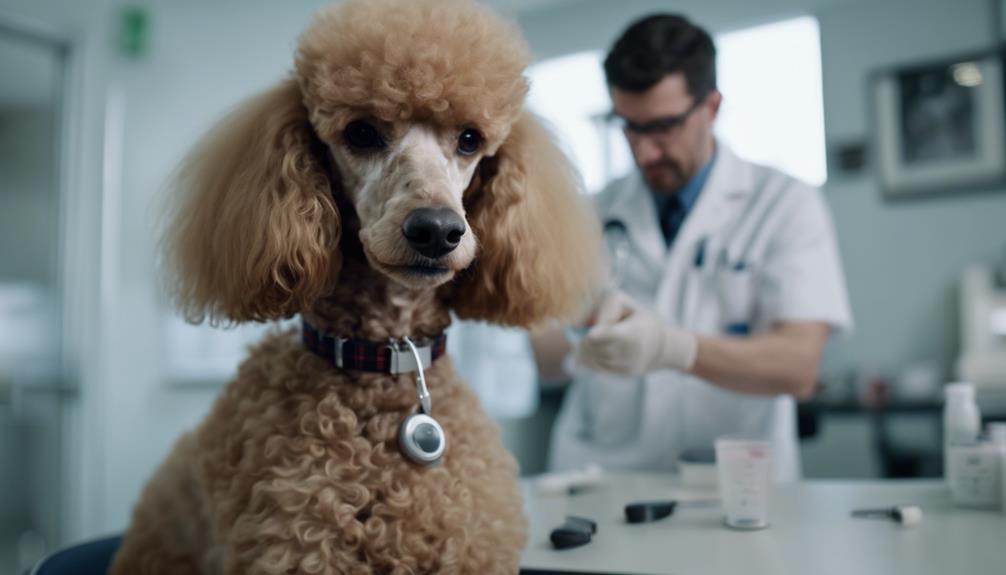If you've noticed your Poodle scratching non-stop or experiencing tummy troubles, you might be dealing with more than just a minor irritation. Allergies in Poodles can be quite a handful, causing discomfort and distress. Understanding the signs and symptoms is just the beginning; uncovering the root causes and finding suitable treatments can be a game-changer for your furry companion's well-being. But how can you ensure your Poodle gets the right care tailored to their specific allergy type? Find out how to navigate the world of managing allergies in Poodles for a happier, healthier pet.
Key Takeaways
- Identifying allergy symptoms like itching and red sores is crucial.
- Consult a vet for accurate diagnosis and tailored treatment plans.
- Avoid allergens, use specialized diets, medications, and immunotherapy.
- Implement lifestyle adjustments like grooming, hypoallergenic environment, and nutritious diet.
Poodle Allergies Overview

Around 20% of Poodles may experience allergies, causing a range of symptoms that can be triggered by various factors. Common symptoms of allergies in Poodles include itching, red sores, and a dull coat. These symptoms often manifest on the skin, making it crucial to pay attention to any changes in your Poodle's skin health. Allergies in Poodles can be quite common and can be triggered by contact allergens, flea saliva, specific food ingredients, or environmental factors. It's essential to be aware of these triggers to help manage your Poodle's allergies effectively.
When it comes to treatments, addressing Poodle allergies often involves a combination of strategies. These might include allergen avoidance, specialized diets, medications like antihistamines or steroids, and in some cases, immunotherapy. Consulting with a veterinarian is crucial to determine the most suitable treatment plan for your Poodle's specific allergies. Remember, each Poodle is unique, so what works for one may not work for another. By staying informed and working closely with your vet, you can help alleviate your Poodle's allergy symptoms and improve their quality of life.
Recognizing Allergy Symptoms

If your Poodle is experiencing allergies, being observant of their behavior and physical changes is essential in recognizing potential symptoms. Allergy symptoms in Poodles can manifest in various ways, including excessive itching, red sores, chewing/biting at the skin, eye or chest congestion, and a dull coat. Poodles with allergies may exhibit behaviors such as excessive licking, scratching, and rubbing against surfaces. Skin issues like redness, inflammation, and hair loss can be indicative of allergic reactions in Poodles. Additionally, respiratory symptoms like sneezing, coughing, and wheezing may suggest environmental allergies in your furry friend. By observing changes in behavior, appetite, and activity levels, you can better identify allergy symptoms in your Poodle.
| Symptoms | Description |
|---|---|
| Excessive itching | Persistent scratching or biting at the skin |
| Red sores | Inflamed, irritated areas on the skin |
| Chewing/biting skin | Compulsive behavior directed at the skin |
| Dull coat | Lackluster, unhealthy-looking fur |
Identifying Allergy Causes

To properly identify the causes of allergies in your Poodle, it is crucial to consider common triggers such as flea exposure, food ingredients, indoor and outdoor allergens, and contact with various substances. Identifying the specific cause of allergies involves monitoring for triggers, knowing food ingredients, observing when and where allergies occur, and pinpointing direct contact allergens. When dealing with allergies in your Poodle, it's essential to be vigilant and proactive in determining the root cause to provide effective treatment and relief.
- Flea exposure: Flea allergies can lead to severe reactions in Poodles due to exposure to flea saliva.
- Food ingredients: Food allergies in Poodles can manifest as skin issues, digestive problems, and ear infections, especially if weaned too early.
- Environmental allergens: Pollen, mold, and dust mites are common culprits that can trigger allergic reactions in Poodles, affecting their skin and overall well-being.
Diagnosing Poodle Allergies

When it comes to diagnosing allergies in your Poodle, testing for allergens can be crucial in identifying triggers. Common symptoms such as itching, sneezing, or digestive issues may manifest when your Poodle is exposed to allergens. By working closely with your vet and following their recommended diagnostic plan, you can effectively pinpoint and manage your Poodle's allergies.
Testing for Allergies
When diagnosing allergies in your Poodle, blood and saliva tests may not provide reliable results, leading veterinarians to conduct elimination trial diets as a more accurate diagnostic approach. During this process at the vet's office, you can expect the following:
- Prescription Diets: Your vet will provide specific prescription diets to eliminate potential allergens.
- Trial Diets: These diets are strictly followed for 2 to 3 months to assess your Poodle's reaction.
- Identifying Allergens: Changes in diet, toothpaste, and medication may be recommended to pinpoint the allergen causing the reaction.
Following these steps diligently will help you and your veterinarian identify and manage your Poodle's allergies effectively.
Common Symptoms Manifest
If your Poodle is displaying symptoms such as vomiting, diarrhea, itchy skin, or excessive licking, these could be indicators of potential food allergies that require prompt attention and diagnosis. Common signs of food allergies in Poodles typically appear by the age of 6 months, including lethargy, hyperactivity, aggression, weight loss, hives, and excessive gas. Persistent diarrhea or vomiting without a clear cause may signal a mild food allergy. Poodles experiencing year-round ear infections and rashes might also have food allergies. It's crucial to monitor and recognize these symptoms early to effectively diagnose and manage food allergies in your Poodle. By identifying these signs promptly, you can explore suitable treatment options to ensure your furry companion's well-being.
Allergy Treatment Options

To effectively manage allergies in Poodles, exploring various treatment options is essential. When it comes to addressing allergy concerns in your furry companion, consider the following options:
- Antihistamines: These can help alleviate symptoms of food allergies in Poodles, such as itching and skin irritation.
- Medicated Baths and Topical Treatments: Utilizing medicated shampoos and topical treatments can soothe skin inflammation in Poodles with atopy.
- Prescription Diets: After elimination trials, prescription diets are often recommended to prevent allergic reactions and promote overall well-being in Poodles.
Each Poodle is unique, and finding the right treatment may require some trial and error. Remember, prompt treatment is crucial to prevent any further complications like gastrointestinal issues or secondary infections. By working closely with your veterinarian, you can develop a tailored treatment plan that suits your Poodle's specific needs and helps alleviate their allergy symptoms effectively.
Managing Allergy Recovery

As you navigate your Poodle's allergy recovery, consider following a recovery timeline to monitor progress effectively. Lifestyle adjustments, like providing a hypoallergenic environment, can aid in your Poodle's healing process. Remember to administer medications consistently as prescribed by your veterinarian to ensure a smooth recovery journey.
Recovery Timeline Tips
Recovery from allergies in Poodles typically spans an average of 2 to 3 months, emphasizing the importance of adhering to a strict elimination diet for effective monitoring of progress. As you navigate through this recovery timeline, keep these tips in mind:
- Watch closely for any improvement in symptoms during the process.
- Consider the gradual reintroduction of potential allergens to pinpoint specific triggers.
- Maintain regular communication with your vet to adjust the treatment plan as needed and ensure successful allergy recovery for your Poodle. Remember, patience and diligence are key in helping your beloved pet feel better.
Lifestyle Adjustments Aid
Making lifestyle adjustments can significantly aid in managing allergies in Poodles. To create a hypoallergenic environment for your furry friend, consider using allergen-free bedding and cleaning products. These changes can help reduce allergy symptoms triggered by environmental factors. Regular grooming and bathing routines play a crucial role in alleviating skin irritation and minimizing exposure to allergens. Providing a nutritious diet tailored to your Poodle's specific needs can strengthen their immune system, supporting overall health during allergy recovery. Additionally, incorporating regular exercise and mental stimulation can boost your Poodle's immune system and reduce stress, potentially improving allergy symptoms. By implementing these lifestyle adjustments, you can help your Poodle better cope with allergies and lead a healthier, happier life.
Consistent Medication Administration
For effective management of your Poodle's allergy recovery, ensuring consistent administration of medication is crucial in maintaining progress and minimizing recovery time. Here are some key points to consider:
- Establish a medication schedule: Creating a routine for giving medications helps in ensuring timely doses.
- Monitor symptom control: Regularly assess your Poodle's symptoms to see if the current medications are working effectively.
- Communicate with your veterinarian: Keeping in touch with your vet allows for adjustments in treatment based on your Poodle's progress.
Prevention and Long-Term Care

Regular grooming and bathing play a crucial role in preventing skin allergies in Poodles by maintaining a clean coat free of irritants. To prevent long-term skin issues in your Poodle, it is essential to identify and eliminate allergens that trigger reactions. Following a vet-recommended diet and using hypoallergenic products can aid in long-term allergy management. Consistent monitoring for symptoms and prompt treatment can minimize the impact of allergies on your Poodle's skin health. Seeking guidance from a vet or specialist can provide personalized strategies for preventing and managing allergies in Poodles.
| Prevention Strategies | Description | Benefits |
|---|---|---|
| Regular Grooming | Brushing and trimming fur | Removes dirt and allergens |
| Bathing | Using gentle, hypoallergenic shampoos | Cleanses the skin and coat thoroughly |
| Allergen Identification | Identifying triggers like pollen or dust | Helps avoid exposure to irritants |
| Vet-Recommended Diet | Following a specific diet plan | Reduces potential allergic reactions |
Frequently Asked Questions
What Are Poodles Most Allergic To?
You're wondering what poodles are most allergic to. They can be sensitive to food ingredients like beef, poultry, wheat, and more. Environmental triggers like pollen and dust mites can also cause skin reactions. Allergy testing helps in managing common allergens effectively.
What Is the Most Effective Treatment for Dog Allergies?
To manage dog allergies effectively, consider allergy testing to pinpoint triggers. Explore immunotherapy, medication, and environmental control. Dietary modifications, natural remedies, and consistent vet follow-ups are key. Tailoring treatment to your dog's needs is crucial for relief.
How Do You Neutralize Dog Allergies?
To neutralize dog allergies, start with home remedies. Consider hypoallergenic diets and minimizing environmental triggers. Allergy testing can pinpoint specific allergens. Natural supplements may aid symptom management. Consult a vet for a personalized plan.
How Do You Figure Out What My Dog Is Allergic To?
To figure out what your dog is allergic to, consider allergy testing and an elimination diet. Common triggers like environmental factors and food sensitivities can be identified through skin tests. Treatment options include medication, and managing triggers is key.
Conclusion
You've learned how to manage allergies in your Poodle, just like tending to a delicate garden. By recognizing symptoms early, identifying triggers, and following treatment options, you can help your furry friend thrive. Remember, prevention is key to long-term health. Like a gardener tending to their plants with care, you can nurture your Poodle's well-being and keep allergies at bay. Stay informed, stay vigilant, and watch your Poodle bloom with health and happiness.
